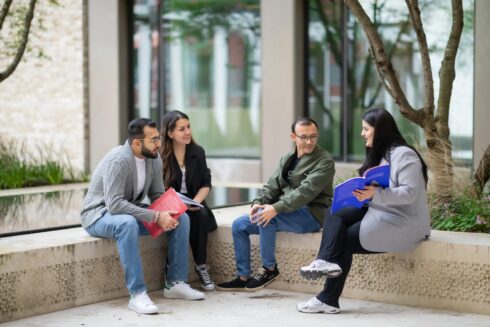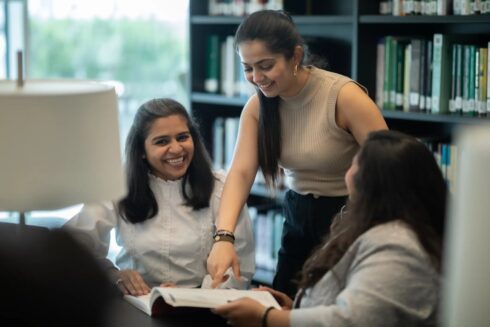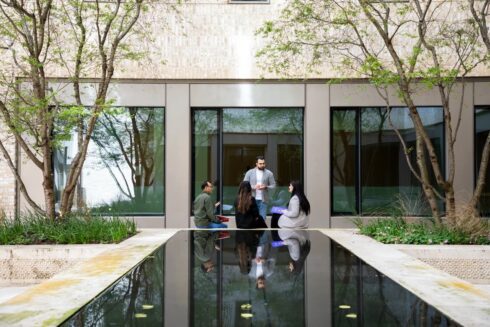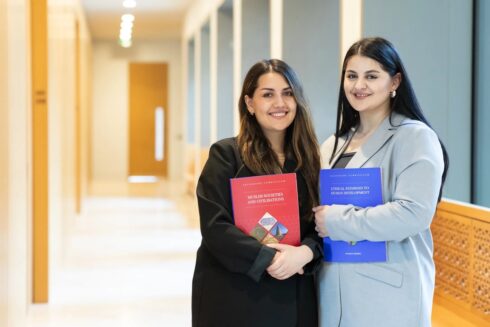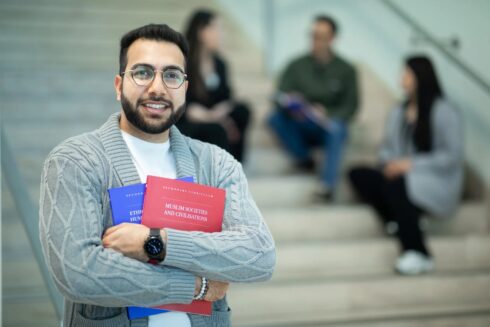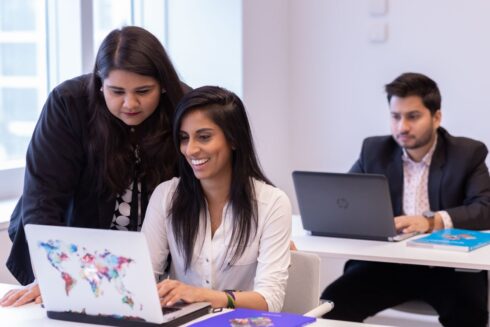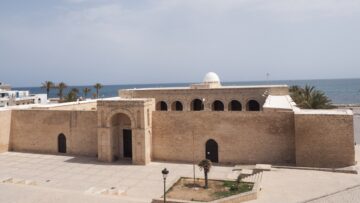Secondary Teacher Education Programme
-
Status
Closed -
Location
London -
Apply by
20 Oct 2025
Teaching practice is central to the programme’s approach to teacher development and provides students with an opportunity to develop their teaching and reflective skills within the classroom. Every student is assigned a mainstream school placement in London or the surrounding regions and will follow a structured placement experience to inform their developing theoretical understanding of reflective practice in a different educational context.
All students are provided with invaluable support from Professional Learning Community (PLC) facilitators and experienced mentors. A STEP student must complete all the Teaching Practice components before they are recognised as a STEP teacher.
The teaching practice consists of several components:
- Comprehensive, practical, field-based school/teaching experiences in mainstream schools in or near London and at Religious Education Centres (RECs) in the United Kingdom or Europe;
- Teaching practice in the Ismaili Religious Education Centres in participants’ own home contexts;
- Lesson planning tutoring and field mentoring through the platform of PLCs;
- Portfolio of Work.
Students are provided with personal, mainly humanities-based, timetables and individually supported to plan, support, and lead lessons. In addition, students will be encouraged to observe a range of teaching practice across the school, to attend school-based training and meetings where relevant, and to engage in a range of other school-based experiences such as educational visits and extracurricular clubs.
Students will be supported in their developmental teaching practice with formative lesson observations and written feedback, regular teaching reviews, and a joint UCL tutor and school-based mentor observation. Students’ school-based learning is the foundation of the first-year written assignments, which develop reflective practice and enquiry as sustainable approaches to teacher learning. Students will have access to a school-based mentor who provides professional guidance and support in the development of their teaching practices.
The Portfolio will allow participants to consolidate their MA and PGDip experiences and their integration with classroom practices, as well as provide a basis for writing their summative assignments and sustain their continued professional development.
There are further elements of STEP, designed and delivered by IIS, which are not part of the accredited modules for the MA and PGDip. Nevertheless, these enrichments are an important and mandatory element of the programme in terms of preparing participants to return to their home countries and take up their posts as STEP teachers.
- Teaching and Learning
A series of Teaching and Learning sessions delivered at IIS complement and further enhance Teaching and Learning provision, gained through PGDip at UCL IOE, in order to teach in secondary classrooms of RECs. - Research Methods
Research study for the MA is desk-based (or, secondary research), which involves identifying and carrying out a systematic review, evaluation and analysis of existing secondary source material and data sets. It entails a systematic investigation by students of an approved topic of their choice, and is aimed at developing a student’s expertise in a specific field as related to the broader aims of IIS’ Secondary Curriculum. Students will be exposed to a range of sessions to help them develop key practical and analytical skills and approaches required for writing a professional-level research paper, including: selecting a topic and formulating a specific research question; identifying and carrying out a systematic review of secondary source material; analysing and synthesising data sets; and presenting results in a written form according to highest academic standards. - Induction into the Field
During the final term of the second year of study, all graduating students will receive sessions aimed to support their transition from full-time students to full-time STEP teachers. Using the experiences of experienced STEP teachers from the field, students will learn about the day-to-day realities of teaching as well as working within the context of an ITREB structure.
The sessions also discuss the wider mandate of ITREB and how that corresponds to the work of IIS. In doing so, it articulates the mandate and philosophy of STEP and how it seeks to add value to the formation of the JamatAssembly or religious congregation; also a term used by the Nizari Ismailis for their individual communities.. Students will also be given an insight into the nature of the collaboration between IIS and ITREB, and how they will continue to be supported by both institutions after their graduation.
IIS’ Secondary Curriculum adopts an approach to the study of Islam based on humanistic, civilisational and normative perspectives. It seeks to acquaint secondary students with the diverse and dynamic interplay of Islamic expressions – religious, social, cultural and material – that have become manifest in Muslim societies of the past and present.
The curriculum applies pedagogical approaches in harmony with its philosophical framework. It calls for a profile of teachers with a broad set of proficiencies that reflects acquaintance with a range of contexts. These pedagogical approaches invite the active engagement of teachers and students with the content of the curriculum, engendering thought and enquiry on Islam generally and the Ismaili tradition specifically as they have developed historically and in contemporary times.
More details can be found on the Secondary Curriculum page.
Unique to our programme, and as part of the MA, students will experience an exploratory field trip to Andalusia, Spain, in the first year of the programme.* This trip facilitates a deeper understanding of curricula content and the collection of relevant resources to teach it.
Visits during this trip usually include: the Great Mosque of Cordoba, which is the only surviving monument of the Caliphate of Cordoba; Madinat al Zahra Museum, which was awarded an Aga KhanA title granted by the Shah of Persia to the then Ismaili Imam in 1818 and inherited by each of his successors to the Imamate. Award for Architecture in 2010; and the magnificent palaces, fountains and gardens of Alhambra, which exemplify the blending of Moorish and traditional Andalusian architecture.
The experiences realised through the field trip will provide students with a unique perspective in their approach to the delivery of IIS’ Secondary Curriculum, in which the study of Muslim societies and civilisations is a crucial element.
What STEP students say?
Abida Nasreen
Pakistan, C17
Beyond academics, STEP fosters cultural exchange, professional development, and community engagement. Working with passionate colleagues, sharing experiences, and supporting one another through challenges makes this journey even more meaningful
Daniyal Wali
Pakistan, C17
These experiences enable us to better understand and respond to the needs of our students while continuing to grow as educators ourselves. Immersing myself in such a dynamic and supportive environment has given me the confidence to pursue this path with purpose, and I am excited to embark on this lifelong journey of learning and service.
* It is the students’ responsibility to obtain a visa for all excursions abroad. In the event of travel restrictions due to unforeseen circumstances including but not limited to a global pandemic such as COVID-19, alternative arrangements will be made to take place in the UK or in an online environment.

